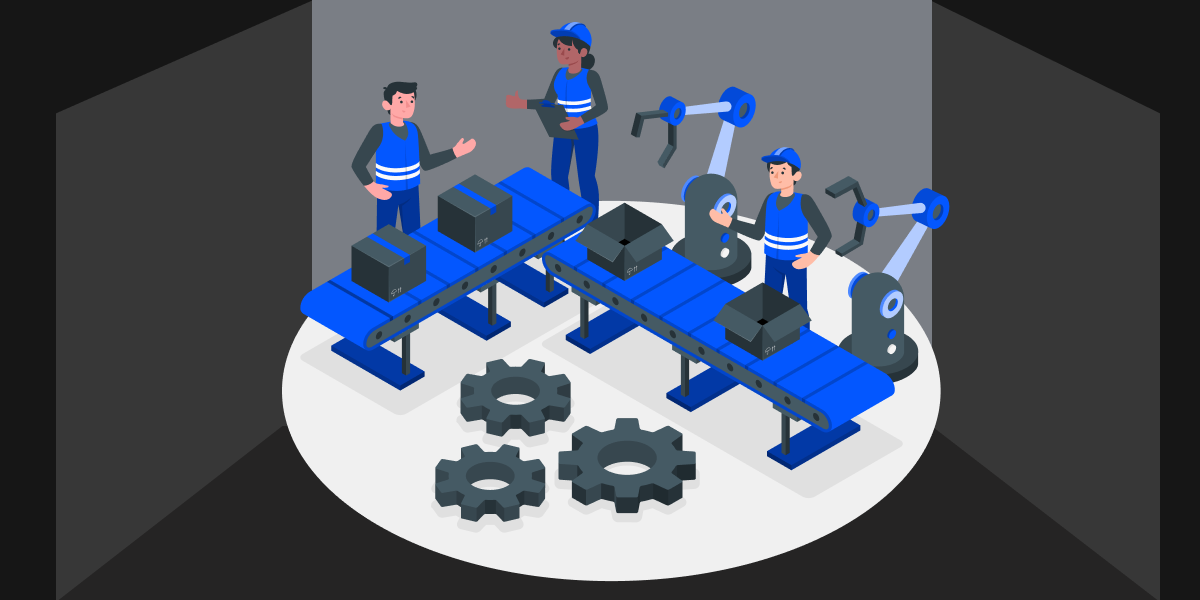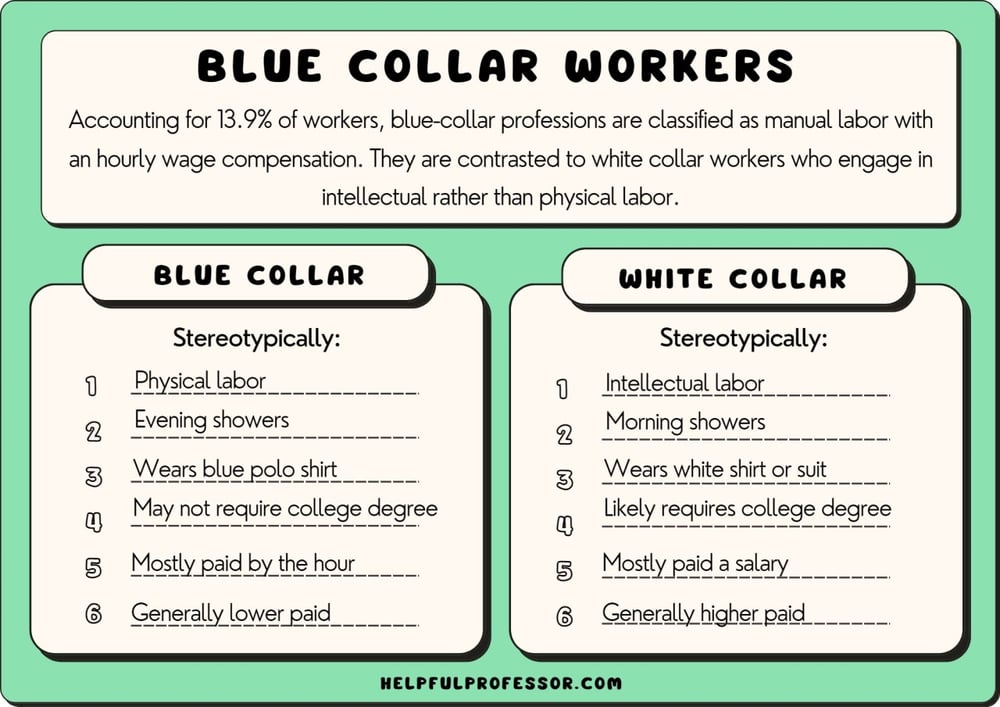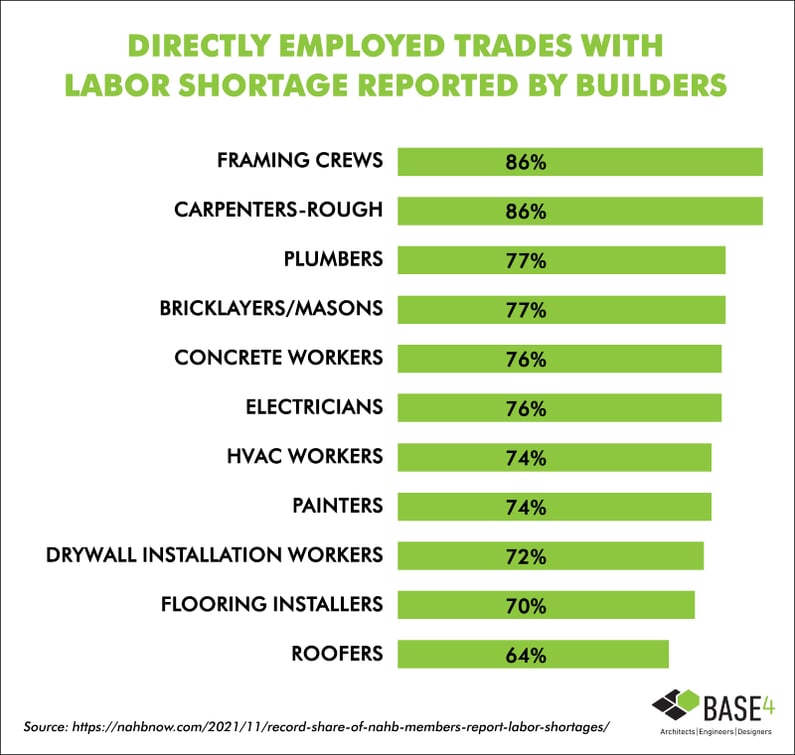The Most Profitable Blue Collar Businesses in the U.S. Today
Skilled trades, home services, and blue collar businesses enjoy high demand & record-breaking profitability. Check out this complete guide.

Jump To...
What is a Blue Collar Business? | Skilled Labor Business - Home-Based versus Business Location | Profitable Blue Collar Business Ideas | Getting Started With Your Blue Collar Business
In an ever-evolving economy, there is a growing need for services that keep the gears of our everyday lives turning. Amidst this demand lies a wealth of opportunities for entrepreneurs to create thriving businesses rooted in skilled trades and manual labor services.
Here we’ll delve into some lucrative blue collar business options, offering valuable insights for both current and aspiring business owners who are keen on discovering promising ventures within this realm.

What is a Blue Collar Business?
Blue collar businesses encompass a wide array of professions revolving around hands-on work or local support services. These roles often necessitate physical strength, technical acumen, or specialized abilities that set them apart from other industries.  Source: Helpful Professor
Source: Helpful Professor
To better understand the potential goldmines hidden within this sector, let's take a closer look at several examples:
- The Versatile Handyman: With expertise ranging from minor household fixes to extensive remodeling projects, handymen and women provide invaluable assistance to homeowners seeking reliable professionals.
- Masters of Landscaping: Combining design prowess with horticultural know-how, landscapers have the unique ability to transform ordinary outdoor spaces into lush oases.
- Organized Movers: Helping individuals transition their belongings from one location to another demands careful planning and efficient execution - skills that successful moving companies excel at.
- Licensed Contracting Specialists: From plumbing and electrical work to HVAC installations, licensed contractors offer essential skills regulated by local ordinances that require proper certification.
- Auto Service Aficionados: Mechanically inclined entrepreneurs can find success diagnosing vehicular issues or repairing cosmetic damage through automotive service establishments.
- Maintenance Maestros: Providing routine maintenance tasks such as painting or gutter cleaning opens up continuous avenues for maintaining residential properties year-round.
- Artisans in Woodworking & Carpentry: For those gifted with creativity and craftsmanship, the world of custom furniture or intricate cabinetry offers endless possibilities to monetize their talents.
These examples provide a snapshot of the diverse and profitable blue collar businesses available for entrepreneurs looking to make their mark. By identifying which opportunities align with your own interests and expertise, you can embark on a successful entrepreneurial journey within this thriving sector.
The Blue Collar Labor Shortage
Because of a staggering 50 million workers quitting their jobs in 2022, traditional blue collar employers continue to face significant labor shortages. According to the U.S. Chamber of Commerce analysis and Bureau of Labor Statistics, December 2022 saw unfilled job openings for:
- 65% of durable goods manufacturing positions
- 40% of wholesale and retail trade roles
- 55% of leisure and hospitality vacancies
Builders also reported widespread scarcity among various trades:
- Nearly 90% indicated a shortage of carpenters and framing crews
- Almost 80% highlighted deficits in plumbers, bricklayers, concrete workers, and electricians
 Source: Base 4
Source: Base 4
This pressing need for skilled laborers presents an enticing landscape for ambitious entrepreneurs who can fill these gaps with high-quality services.

States With Highest Demand for Skilled Labor Entrepreneurs
When it comes to launching a thriving blue collar business, location plays a crucial role in determining demand and potential profitability. Here's a look at some of the top states with the highest demand for skilled labor entrepreneurs:
1. California: The Golden State offers promising opportunities, with an average skilled worker wage of $31.50 and an average blue collar entrepreneur salary of $79,251. A staggering 663,570 open construction jobs reflect the high demand for skilled workers in this state.
2. Texas: Fueled by its impressive 1.8% GDP growth rate, Texas features an average blue collar entrepreneur salary of $59,639 and boasts 568,930 open construction jobs – making it another enticing option.
3. Florida: With a state GDP growth rate of 1.6%, Florida is ripe for entrepreneurial exploration as well – offering an average blue collar entrepreneur salary of $44,747 along with 398,060 available construction jobs.
4. New York: In addition to being known as "The Empire State," New York also stands out when it comes to skilled labor opportunities; featuring an attractive average skilled worker wage at $33.69 and boasting an impressive average blue collar entrepreneur salary of $107,291 amid its bustling economy that currently has over 311k open constructions positions.
5. North Carolina: As one of America's fastest-growing states (+93k population increase), North Carolina presents ample opportunity within its borders – including an appealing blue-collar entrepreneur salary averaging around $67k per year alongside nearly 174k job openings in construction fields.
6. Washington: Similarly enticing are prospects found in Washington State where entrepreneurs can expect steady wages (averaging around $33/hour) coupled with strong earning potential given their median annual income sits just above the national norm at roughly over $81K per annum.
7. Illinois: The Land of Lincoln also offers a promising landscape for skilled labor entrepreneurs, boasting an average skilled worker wage of $34.81 and an enticing blue collar entrepreneur salary around $78k – with over 173k construction jobs waiting to be filled.
8. Massachusetts: Renowned for its rich history and academic prowess, Massachusetts is yet another lucrative option thanks to strong demand evidenced by over 127K job openings in the construction industry alone; all while offering competitive wages averaging just above $34/hour along with yearly earnings often exceeding the national threshold at upwards of around $82K per year on average.
9. Pennsylvania: With a population nearing 13 million residents, Pennsylvania presents ample opportunities for aspiring business owners as well – boasting an attractive blue collar entrepreneur salary averaging just above $65k coupled with numerous employment prospects given that it currently has more than 214k open positions within diverse fields related to construction work.
10. Georgia: Rounding out our list is Georgia which has experienced significant population growth (+73k) recently – providing fertile ground for entrepreneurial success where business owners can anticipate earning close to roughly over $62K annually amidst steady demand marked by nearly 141K job openings available in various sectors tied directly or indirectly towards construction projects throughout this rapidly expanding region.
These top states offer a diverse range of opportunities for skilled labor entrepreneurs to establish and grow successful blue collar businesses. Factors such as population growth, economic stability, and the number of open construction jobs are crucial indicators of demand in the market.
State data sourced from: Zippia, CONEXPO-CON/AGG
Skilled Labor Business - Home-Based versus Business Location
Starting a blue collar business doesn't always mean renting or purchasing a separate commercial space. In fact, many lucrative ventures can be managed effectively from the comfort of your own home office.
Home-based businesses offer flexibility, lower overhead costs, and reduced commute times – all while fostering an environment that encourages work-life balance.
Running Blue Collar Business from Home
A variety of blue collar business ideas lend themselves well to this model - including mobile options where you're technically based at home but visit clients' locations as needed. For instance:
- Appliance Repair Services. Providing repair services for household appliances like washing machines or refrigerators can be easily managed from home with the help of scheduling software and a dedicated phone line for client inquiries.
- Painting & Wallpapering. Operating an interior painting or wallpaper installation business typically requires minimal equipment storage, allowing you to manage projects remotely while keeping tools organized within your garage or workspace at home.
- Mobile Mechanic Services. Transforming your truck or van into a fully-equipped mobile workshop allows you to bring automotive expertise directly to customers’ doorsteps without needing traditional brick-and-mortar facilities.
- Professional Organizer & Decluttering Expert. Offering organization solutions for homes and offices alike can be efficiently coordinated through virtual consultations before visiting clients on-site with specialized tools in tow.
- Custom Furniture Design & Construction. If you have ample space within your property (e.g., garage), creating one-of-a-kind furniture pieces becomes feasible without requiring any additional real estate investment beyond what's already available on-premises.
Knowing When You Need a Separate Business Location
While some blue collar businesses thrive as home-based operations, there are instances when expanding into external premises becomes necessary for continued growth. Identifying these moments often revolves around recognizing certain key indicators:
Space Constraints
As inventory levels increase (e.g., construction materials, large tools) or additional machinery becomes necessary for enhanced production capabilities, your home may no longer be sufficient to accommodate these needs.
Regulatory Compliance
Depending on local regulations and zoning laws, certain types of business activities may be prohibited within residential neighborhoods – necessitating relocation into commercial zones.
Customer Accessibility
If your clientele primarily consists of walk-in customers (e.g., automotive repair shop), a separate location with greater visibility and accessibility can contribute significantly towards driving increased foot traffic.
Scaling Operations
As you hire more employees or expand service offerings, an external facility can provide the space needed for proper training sessions while also fostering camaraderie amongst team members in a dedicated work environment.
Professional Image & Credibility
In some scenarios, operating from a home office might not convey the desired level of professionalism - potentially impacting client perceptions about overall quality or reliability. Securing separate premises can help bolster credibility by demonstrating long-term commitment to your trade.
Profitable Blue Collar Business Ideas
Embarking on a successful entrepreneurial journey doesn't necessarily require a substantial capital investment upfront. In fact, there are several profitable blue collar business ideas that can be started with minimal or no initial funding.
However, it's crucial to consider any licensing, bonding, and certification requirements specific to your chosen field – as well as the basic supplies needed for launching your venture.
Great Businesses You Can Start with No Money
Let’s take a look at some low- and no- budget business ideas to launch your blue collar entrepreneurship.
Handyman Services
This versatile business entails offering a mix of repair, maintenance, and improvement tasks for homeowners. To launch such an enterprise, one would need a basic set of tools (e.g., hammer, drill, screwdrivers), transportation to reach clients' homes, and possibly liability insurance for protection against damages incurred during work. Some states may require licensing or certifications depending on the complexity of services offered.
Delivery, Errand, and Shopping Services
Catering to busy individuals or those with mobility limitations by running errands and delivering goods requires reliable transportation (a car or van), excellent time-management skills, and potentially a smartphone app for order tracking purposes. No formal licensing is typically needed; however, it's essential to have general liability insurance.
Basic Yard and Garden Care
Providing lawn mowing services along with general garden care demands essential equipment, like:
- Lawnmowers (manual or riding),
- Trimmers, edgers, and blowers
- Rakes
- Shovels and spades
- Pruners and shears
- Gloves and safety goggles
In most cases no certification is required, but being bonded is wise.
House Cleaning
Providing residential cleaning services involves ensuring homes are tidy by performing tasks such as vacuuming floors or dusting surfaces. Investing in quality cleaning supplies along with basic marketing materials will help jump-start this venture.
Residential Window Cleaning
Window cleaning businesses cater to homeowners who desire spotless windows without the hassle of doing it themselves. Launching this enterprise requires window-washing equipment like squeegees and buckets, which are relatively inexpensive.
Gutter Cleaning
Cleaning gutters regularly is vital for proper home maintenance but is often neglected due to its labor-intensive nature, which creates a demand for physically capable workers equipped with gutter-cleaning tools and perhaps a ladder.
Holiday Lights Installation
During the festive seasons, many people seek assistance hanging decorative lights around their properties. You can offer your services as a helper without needing any equipment or licenses.
Home Organization
For the decluttering aficionado, offering organization services might be an ideal venture – requiring only basic tidying products (bin bags and gloves), transportation access, and some basic marketing materials. No official licensing is typically necessary here.
Packing and Unpacking
To assist clients during a relocation by offering packing and unpacking support, you don’t necessarily need to bring anything with you – so long as you make it clear that you’re only providing muscle power. Generally, there are no certification or licensing requirements for this type of service; just exercise caution when handling specialized items like antiques or fine art pieces and consider obtaining insurance coverage for added protection.
Home Inspections
Providing comprehensive assessments of properties before purchase involves a keen understanding of construction standards and building codes. To launch a home inspection business, you must obtain proper training, certification, and licensing from accredited organizations like ASHI (American Society of Home Inspectors) or InterNACHI (International Association of Certified Home Inspectors).
Low and Medium-Cost Business Ideas With Huge Profit Potential
If you’ve still got a small budget but can afford to spend a little more, these ideas might work well for you.
Mobile Detailing
Delivering on-the-spot car cleaning and detailing services, mobile detailing businesses require a reliable vehicle, professional-grade cleaning supplies, a portable water source, and insurance coverage. While no specific licensing is required, bonding may be necessary based on local regulations.
Residential and Commercial Painting
Offering painting services for homes or businesses demands high-quality brushes, rollers, drop cloths, ladders or scaffolding, as well as marketing materials. Licensing requirements vary by state; however, bonding and liability insurance are typically recommended. Commercial service pros are going to need more insurance and liability protection over residential, but commercial jobs also pay more.
Locksmith
Aspiring locksmiths need specialized tools like lock picks and key-cutting machines to provide unlocking solutions. Acquiring state-specific licensure is often mandatory alongside certification from recognized organizations like ALOA (Associated Locksmiths of America).
Moving
Starting a moving business necessitates trucks or vans equipped with dollies or hand carts for transporting items safely. Licensing requirements differ depending on interstate vs intrastate moves; securing appropriate permits along with general liability insurance is crucial.
Landscaping & Tree Service
Launching landscaping/tree service enterprises calls for equipment such as mowers, trimmers, chainsaws plus safety gear. Certification from the International Society of Arboriculture (ISA) can lend credibility, while certain states mandate licensing or pesticide application certificates.
Electrical Services
Electricians need tools like wire strippers, multimeters, and electrical tape to perform installations or repairs. State-specific licensing is typically required for electricians, with some states also necessitating continuing education or periodic license renewals.
Plumbing Services
Armed with pipe cutters, wrenches, and plungers, plumbers can offer residential or commercial services. Licensing requirements vary by state but usually involve passing an exam; insurance coverage is strongly recommended to protect against potential liabilities.
Residential & Commercial Cleaning
Using eco-friendly cleaning supplies and equipment such as vacuums and mops, professional cleaners cater to various properties' needs. Although no specific licenses are mandated in most regions, acquiring liability insurance offers protection against damages.
Junk Removal
Operating a junk removal business entails possessing a truck or trailer for hauling waste alongside basic transportation equipment. Permits may be needed depending on the type of materials handled; liability insurance is advisable to cover any unexpected incidents.
HVAC Replacement, Maintenance & Repair Services
Specialized HVAC technicians require tools like leak detectors and thermometers for servicing heating/cooling systems. Licenses are mandatory in certain states while technician certifications from organizations like NATE (North American Technician Excellence) boost credibility.
Carpet Cleaning
With carpet cleaning machines and eco-friendly solutions at hand, entrepreneurs can address various flooring concerns. While no specific licensure is obligatory across the board, obtaining IICRC certification (Institute of Inspection Cleaning & Restoration Certification) adds value to your service offerings.
Cabinetry & Carpentry
Skilled woodworkers crafting custom furniture or cabinets need woodworking tools along with design software capabilities. Licensing requirements vary based on scope: general contractor licenses might apply for larger projects; bonding provides added assurance when dealing with clients.
Small Engine Maintenance & Repair
Equipped with diagnostic devices plus repair instruments specialized in small engines – lawn care machinery maintenance becomes possible without formal licensing prerequisites except in certain states. Liability insurance is advisable for damage protection.
Roofing
As a roofer, materials such as shingles, hammers, and nails are needed to perform installations or repairs. Licensing requirements depend on your state; obtaining contractor liability insurance is essential due to the elevated risks associated with this line of work.
Solar Installation
Solar installers require specific tools like solar panels, wiring systems, and mounting equipment while also being adept at handling electrical components. Many states necessitate licensing in addition to certification from organizations like NABCEP (North American Board of Certified Energy Practitioners).
Power & Pressure Washing
Investing in professional-grade power washing equipment allows you to offer cleaning services for various surfaces. While no nationwide licensure exists for pressure washing businesses, researching local regulations regarding water usage restrictions or wastewater disposal guidelines is essential.
High-Cost, High-Reward Blue Collar Businesses
A larger budget gives you a bit more wiggle room to launch businesses like the following.
Home Services Franchise
Investing in a home services franchise offers the advantage of leveraging an established brand, training, and marketing support. Startup costs can be significant, covering franchise fees, equipment purchases, and initial inventory. Licensing requirements vary depending on the specific service offered within the franchise; insurance coverage is essential to protect against potential liabilities.
Automotive Maintenance & Repair
Opening an automotive repair shop necessitates substantial financial investment to acquire a well-located facility, diagnostic machinery, tools, and parts inventory. Licensing requirements may include business permits or licenses based on local regulations; ASE (Automotive Service Excellence) certification adds credibility to your establishment.
Long-Haul Trucking
Starting a long-haul trucking business requires purchasing or leasing heavy-duty trucks with sleeper cabins while also hiring experienced drivers or obtaining your own CDL (Commercial Driver's License). Operating authority registration through FMCSA (Federal Motor Carrier Safety Administration) is mandatory, along with securing adequate insurance coverage.
Solar Supply & Installation
Launching a solar supply and installation enterprise demands investing in solar panel products alongside mounting equipment and electrical components inventory. Many states require specific licensing for solar installations; acquiring certification from organizations like NABCEP (North American Board of Certified Energy Practitioners) lends additional credibility to your business.
General Contracting - Residential & Commercial Building
Establishing a general contracting firm for residential/commercial building projects entails procuring construction materials plus specialized tools/equipment while maintaining relationships with skilled subcontractors. State-specific contractor licenses are often obligatory, with bonding typically mandated as well; liability insurance protects against risks associated with construction projects.
Getting Started With Your Blue Collar Business
Embarking on a journey within the realm of blue collar businesses presents an array of lucrative opportunities for entrepreneurs with diverse skill sets and interests. As demonstrated throughout this article, there are numerous profitable ventures ranging from cost-efficient to high-cost, high-reward business models.
 Source: GoSite
Source: GoSite
By aligning your passion and expertise with market demand and ensuring compliance with local regulations, you'll be well-equipped to establish a thriving blue collar business that not only generates profits but also provides valuable services within your community.
%20(1)%20(1).png?width=340&name=Group%2012%20(2)%20(1)%20(1).png)



